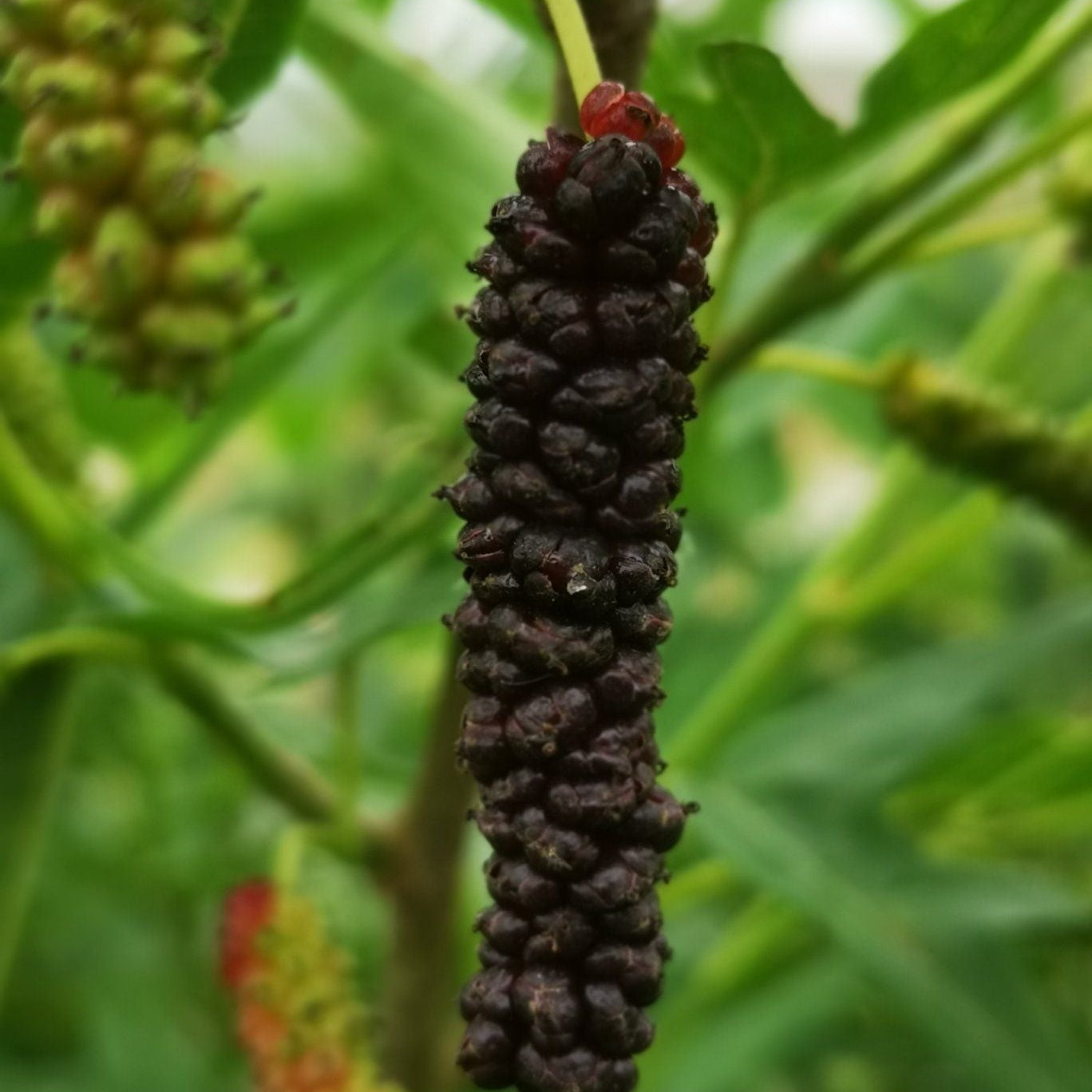Love it? Add to your wishlist
Your favorites, all in one place. Shop quickly and easily with the wishlist feature!
[message]
[title]
[message]



Veliyath Gardens
Couldn't load pickup availability
Chicken Claw Mulberry Live Plant (Morus trilobata)
The Chicken Claw Mulberry (Morus trilobata), also called Bird’s Leg Mulberry, is a fascinating and rare variety admired worldwide for its unusual leaf shape and incredibly sweet fruits. The leaves resemble the claws of a chicken, giving this exotic fruit tree its name and making it a collector’s treasure.
Beyond its ornamental beauty, the tree is valued for its nutrient-rich fruits, which are elongated, deep red-violet to black when ripe, and known for having the highest Brix value ever measured among mulberries. This makes the Chicken Claw Mulberry one of the sweetest mulberries in existence.
At Veliyath Gardens, we bring you this special fruit plant, cultivated with care, so plant lovers can enjoy a tree that combines beauty, taste, and medicinal heritage in their own gardens.
Botanical Name: Morus trilobata
Common Names: Chicken Claw Mulberry, Bird’s Leg Mulberry, Shahtoot (India), Sang Shen (China), Toot (Middle East), Seriguela de Mora (Brazil)
Growth Habit: Small to medium-sized deciduous tree
Leaves: Distinct claw-shaped foliage, highly ornamental
Bloom & Fruiting: Begins bearing fruits in just 1 year
Soil Preference: Thrives in well-drained, fertile soils; adapts to sandy or loamy conditions
Climate Suitability: Best suited for tropical and subtropical regions
Maintenance: Moderate care — pruning, watering in dry seasons, and light feeding enhance growth and yield
The fruits of the Chicken Claw Mulberry are among the most sought-after in the mulberry family.
Shape & Color: Elongated berries that mature from deep red-violet to black.
Taste Profile: Intensely sweet, smooth-textured pulp, with a honey-like richness.
Nutritional Value: Rich in Vitamin A, Vitamin E, Vitamin C, carotenoids, and minerals such as iron and calcium.
Sugar Content: Holds the record for the highest Brix value in mulberries, making it exceptionally sweet.
Fresh Consumption – Best eaten straight from the tree for natural sweetness.
Desserts – Adds depth to pies, cakes, tarts, and ice creams.
Jams & Preserves – Makes flavorful mulberry jams, syrups, and spreads.
Beverages – Used in juices, smoothies, wines, and fermented drinks.
Drying – Can be dried like raisins for long-term storage and snacking.
This exotic fruit is not only delicious but also packed with health-boosting nutrients and antioxidants.
Supports overall body health with vitamins A, C, and E along with iron, potassium, and calcium.
Carotenoids and polyphenols protect the body against oxidative stress, reduce cell damage, and slow down aging.
Helps reduce scars and age spots
Keeps skin smooth, firm, and youthful
Prevents premature wrinkles
High vitamin C content strengthens the immune system, helping the body resist infections.
Its fiber aids smooth digestion, prevents constipation, and promotes gut health.
The naturally high sugar levels provide quick energy, making it an excellent fruit for children, athletes, and those needing an instant energy boost.
Antioxidants improve cardiovascular function.
Vitamin A maintains healthy eyesight and reduces risk of eye degeneration.
The Chicken Claw Mulberry has been respected in traditional medicine systems across Asia and the Middle East for centuries:
Leaves – Brewed as tea to regulate blood sugar and improve metabolism.
Fruits – Consumed for sore throats, fatigue, and digestive discomfort.
Bark and Roots – Used in traditional Chinese remedies for liver and respiratory ailments.
Skin Care – Crushed leaves and fruit extracts applied for wounds, blemishes, and natural healing.
Growing this exotic fruit tree is relatively easy with moderate care:
Sunlight: Prefers full sunlight for maximum fruit production.
Watering: Regular watering is needed, especially in dry months. Avoid waterlogging.
Fertilization: Organic compost or balanced fertilizers encourage healthy growth.
Pruning: Light pruning shapes the tree and boosts fruiting.
Pests/Diseases: Generally hardy, but occasional pest control may be required.
Propagation: Can be grown from cuttings or grafted for true-to-type fruit.
Exotic Appeal: Rare claw-shaped leaves make it a conversation starter in any exotic fruit garden.
Nutritional Value: Packed with vitamins, minerals, and antioxidants.
Early Fruiting: Produces delicious fruits in just 1 year.
Culinary Versatility: Can be eaten fresh, dried, or used in recipes.
Medicinal Importance: Traditional uses highlight its natural healing potential.
Collector’s Delight: A rare variety cherished in plant nurseries and botanical collections worldwide.
The Chicken Claw Mulberry (Morus trilobata) is more than just a fruit plant—it is an ornamental beauty, a medicinal treasure, and a source of one of the sweetest tropical fruits in the world. At Veliyath Gardens exotic fruit plant nursery, we take pride in offering this rare and valuable tree to plant lovers.
Add this exotic fruit tree to your home or orchard, and enjoy the perfect combination of beauty, health, and heritage for years to come.
Soil Preference: Thrives in well-drained, fertile soils; adapts to sandy or loamy conditions
Climate Suitability: Best suited for tropical and subtropical regions
Maintenance: Moderate care — pruning, watering in dry seasons, and light feeding enhance growth and yield
Antioxidant Powerhouse
Carotenoids and polyphenols protect the body against oxidative stress, reduce cell damage, and slow down aging.
Skin and Beauty Benefits
Helps reduce scars and age spots
Keeps skin smooth, firm, and youthful
Prevents premature wrinkles
Boosts Immunity
High vitamin C content strengthens the immune system, helping the body resist infections.
Digestive Health
Its fiber aids smooth digestion, prevents constipation, and promotes gut health.
Exotic Appeal: Rare claw-shaped leaves make it a conversation starter in any exotic fruit garden.
Nutritional Value: Packed with vitamins, minerals, and antioxidants.
Early Fruiting: Produces delicious fruits in just 1 year.
Culinary Versatility: Can be eaten fresh, dried, or used in recipes.




